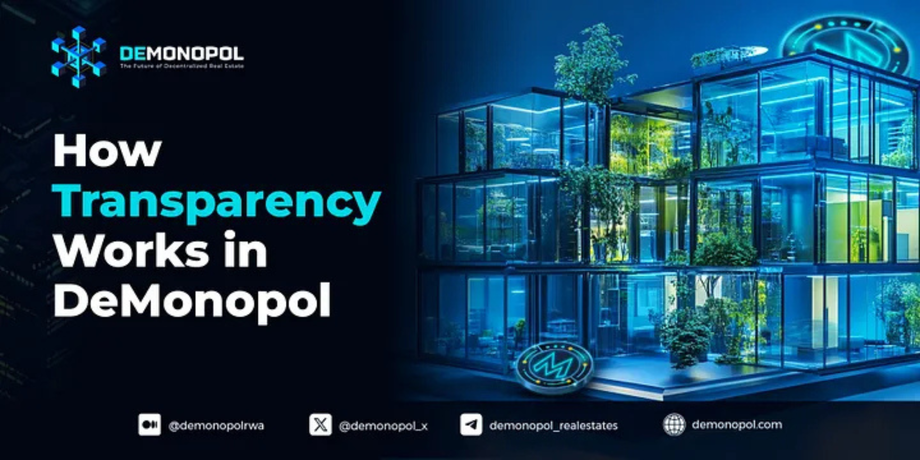In the intricate world of real estate, transparency has often been a coveted yet elusive goal. Traditional property transactions are frequently marred by opaque processes, hidden fees, and a lack of accessible information, leading to mistrust and inefficiencies. Enter DeMonopol, a pioneering platform leveraging blockchain technology to revolutionize the real estate landscape by embedding transparency at its core.
The Imperative of Transparency in Real Estate
Consider the traditional process of purchasing a property. It is akin to navigating a labyrinth with numerous intermediaries agents, lawyers, and banks each adding layers of complexity and cost. This convoluted journey often obscures critical information, leaving buyers and investors in the dark about ownership histories, transaction specifics, and potential encumbrances. Such opacity not only breeds mistrust but also exposes parties to risks like fraud and disputes.
A report by Deloitte highlights that blockchain technology has significant potential to drive transparency, efficiency, and cost savings for commercial real estate owners by removing inefficiencies in key processes
Blockchain: The Bedrock of Transparency
At its essence, blockchain functions as a decentralized ledger, recording transactions across a network of computers in a manner that prevents subsequent alteration. Imagine it as a public diary where every entry is time-stamped and immutable, accessible to all but alterable by none. This structure ensures that once information is recorded, it remains a permanent and verifiable part of the ledger.
In the context of real estate, blockchain’s transparency is transformative. Every transaction, from property listings to sales, is documented on this public ledger, providing an unalterable and accessible record. This means that all stakeholders buyers, sellers, investors, and regulators can access and verify transaction details in real-time, fostering trust and reducing the need for intermediaries.
DeMonopol harnesses the power of blockchain to create a transparent and efficient real estate investment platform. By tokenizing real estate assets, DeMonopol allows properties to be divided into fractional shares, enabling investors to own a portion of a property without the need for substantial capital. Each token represents a stake in the asset and is recorded on the blockchain, ensuring transparent and immutable ownership records.
When a property is listed on DeMonopol, all pertinent information valuation reports, legal documents, and ownership history—is uploaded to the blockchain. Investors can access this information seamlessly, ensuring they have a comprehensive understanding of the asset before investing. This level of transparency is akin to having a crystal-clear window into the property’s background, condition, and financial performance.
Fraud has long plagued the real estate industry, with issues like title disputes and false ownership claims causing significant financial losses. Blockchain’s immutable ledger addresses these challenges by providing a verifiable and tamper-proof record of ownership.
In traditional systems, property records can be altered or forged, leading to potential legal battles and financial setbacks. With DeMonopol’s blockchain-based approach, once a transaction is recorded, it cannot be changed, ensuring the integrity of ownership records. This immutability acts as a safeguard against fraud, as any attempt to alter records would be immediately evident to all participants in the network.
Automated and Transparent Financial Transactions
Financial transparency is another cornerstone of DeMonopol’s platform. Utilizing smart contracts—self-executing contracts with terms directly written into code—DeMonopol automates processes like rental income distribution and dividend payments.
Consider a scenario where an investor owns tokens representing a share in a rental property. As tenants pay rent, the smart contract automatically calculates and distributes the investor’s share of the income, all recorded on the blockchain. This process eliminates manual intervention, reduces the potential for errors, and provides investors with real-time visibility into their returns.
Regulatory Compliance and Transparent Reporting
Compliance with regulatory standards is paramount in real estate transactions. DeMonopol integrates Know Your Customer (KYC) and Anti-Money Laundering (AML) procedures directly into its platform, ensuring that all participants are verified and transactions adhere to legal requirements.
All compliance-related information is stored on the blockchain, providing regulators and auditors with transparent access to necessary data. This not only simplifies the auditing process but also enhances trust among investors, knowing that the platform operates within legal frameworks.
To illustrate, consider a hypothetical property Sunset Villas listed on DeMonopol. The property undergoes a thorough valuation, and all legal documents are prepared and uploaded to the blockchain. The property is then tokenized into 1,000 shares, each representing a fractional ownership.
Investor Journey:
- Jane, an investor, purchases 10 tokens, equating to a 1% stake in Sunset Villas.
- All details of her investment purchase price, ownership percentage, and transaction date are recorded on the blockchain.
- As the property generates rental income, Jane’s share is automatically calculated and distributed to her wallet via a smart contract.
- She can view all transactions in real-time, providing her with complete transparency over her investment.
DeMonopol vs. Traditional Real Estate Platforms
Traditional real estate investments often involve high entry barriers, opaque processes, and limited liquidity. DeMonopol addresses these challenges by offering:
- Lower Entry Barriers: Fractional ownership allows investors to participate with smaller capital outlays.
- Enhanced Transparency: Blockchain records provide clear and immutable transaction histories.
- Increased Liquidity: Tokens can be traded on secondary markets, offering investors flexibility.
A comparative analysis reveals that platforms like DeMonopol not only democratize access to real estate investments but also instill greater trust through transparent operations.
Transparency is the foundation upon which trust is built in any industry, and real estate is no exception. By leveraging blockchain technology, DeMonopol has redefined the standards of transparency, efficiency, and accessibility in property investment. Whether it’s through immutable ownership records, automated income distribution, or compliance with regulatory standards, DeMonopol ensures that every aspect of its platform fosters confidence and reliability among its users.
Ready to start your journey with RWA? Visit our website today to get started on your investment journey.
Website: https://www.demonopol.com
Follow us on all our social platforms to stay informed about the latest trends, updates, and insights into RWAs, tokenization, and investment opportunities
#DeMonopol #Tokenization #Blockchain #DeFi #AI #RealEstate #RWA
#FractionalInvestment #DAO #DigitalAssets #InvestSmart
#CryptoInnovation #DecentralizedFinance #AssetTokenization
#InvestmentRevolution #CryptoEcosystem
gamifi Tokenization rwa realestate CryptoEcosystem

